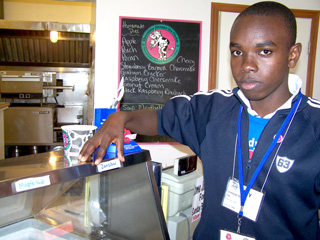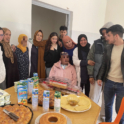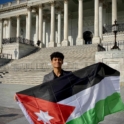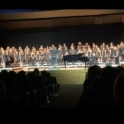Maryame has taken the lessons learned from her exchange year to make a difference in her community.
STORIES
Exchange Student from Kenya Looking Forward to Learning about American Culture

This article originally appeared in the Spring Valley Tribune
by Sonya Meyerhofer
A foreign exchange student from Africa is now temporarily calling the Spring Valley area home and participating in studies and sports at Kingsland.
Jeremiah (Jerry) Ondieki, 16 years old and an 11th grader at Kingsland, is from Kenya, Africa, in a town called Mombasa on the east coast. He arrived in the United States on Aug. 7, came to Minnesota on Aug. 10 and is staying with Jeff and Jacki Gillespie and family of rural Spring Valley. He plans to stay in the States until June or July next summer. His hobbies include swimming, cycling, traveling and watching movies. He is also participating on the Kingsland cross-country team this season.
Ondieki is taking part in the "YES" program, which stands for "Youth Exchange and Study." This is a government-sponsored program. The program provides scholarships to deserving students who are chosen based on merit. Students are required to keep track of their activities and report it to a local coordinator. The exchange students in the program are also required to give presentations to the public.
In his time as an exchange student, Ondieki said he is "looking forward to learning new American culture so I can teach Kenyans when I go back to my country. I'm also intending to learn a lot about American history and the do's and don'ts in America."
Ondieki comes from a family of four, including himself. His father is 48 years old and is a chef, his mother is 46 years old and is a teacher, and his sister is 23 years old and attends college.
He noted that some of the differences from his culture and American culture is that they have 42 different language groups in Kenya. "I come from one called "kisii." He added that polygamy is allowed in his culture and that they used to practice wife inheritance but it is now abolished. This meant that if the husband died, the husband's brother inherited the wife.
He said his staple food is bananas, not ripe ones but raw and cooked. "Some of the differences between Kenyan culture and American is that Americans are extravagant. They spend a lot of money and eat any time they feel like eating.
"Also in America, somebody has to look at you directly in the face while talking. This is different in Kenya because you have to look down while talking to a person that is older than you. When you look at somebody directly in the eye he sees that you are challenging him."
The difference in the school days from his hometown to the U.S. is that school days are longer in Mombasa and he is required to wear a uniform. Ondieki noted, "In Kenya school starts at 7 a.m. and ends at 5 p.m. There is no switching of classes at any cost, so you have to be in the same class all year round."
He said, "We wear uniforms in every school in Kenya. In my school we wore white T-shirts and creamish brown trousers and failure to do so would mean you were suspended."
He added that no cars are allowed on school property by students, but even if they were allowed the students couldn't afford them anyway like students can in the U.S.
Ondieki said he has enjoyed his time at Kingsland so far. "I like Kingsland because it helped me discover what I can do - cross-country. I'd like to give special thanks to Brian Hoff, my coach, and all my fellow athletes for encouraging me to run."
He also likes the "kind of teaching they have" that he considers student-friendly and the food at school. "It is very sweet, cooked professionally and it's absolutely amazing."
Some notable moments so far during his time in the States has been a trip with his host family to Michigan. "I really enjoyed it," he said. He has also traveled to Virginia and Washington, D.C. "I would like to travel to all the states if possible, particularly to New York, California and Indiana.
He also really likes Spring Valley because "it's quiet and the environment is conducive for me unlike in Mombasa, where it's noisy all the time. It's cool here and I like that because it's somewhat hot for me in Kenya, it's about 80-degrees year round."
According to Ondieki, Mombasa has a population of 7 to 10 million. This is a big difference when it compares to the size of Spring Valley. "I like it because it's near the ocean and I swim a lot," he said. It has many tourist attractions such as Fort Jesus, Gede ruins and the Shimoni caves.
He added, "There are many, many wild animals and there are marine parks inside the ocean where you get to see the marine life. There are good sandy beaches, natural rain forests, mangrove forests in the ocean, lake "Nakuru" that is home to more than 10,000 flamingoes." These are just some of the attractions that mark the area's beautiful scenery, according to Ondieki.
When it comes to food in the U.S., he said he really enjoys pizza and sandwiches. What he misses when it comes to food from his country is "ugali." "This is a kind of cake made out of corn flour eaten with either cabbage or kales." He said he misses the spicy foods of Mombasa like pilau, biriani (spiced rice) and sambusa, among many others.
When he returns home he will still be in 11th grade because the education system is different than in the United States. His future plans include going to university and studying medicine, but he noted if that failed, he would become a chef. "Like father, like son," Ondieki added.
"I look forward to coming back to the U.S., it's really nice."





